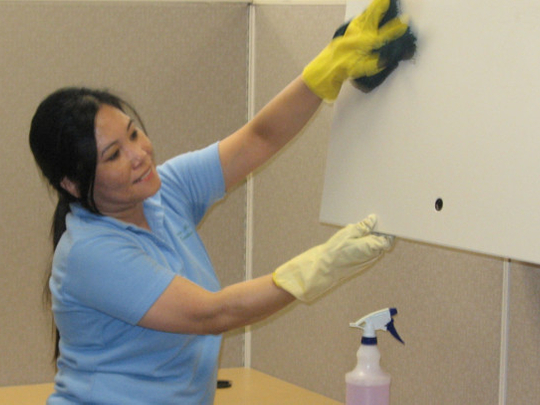
Dubai: Hiring Filipino housemaids has become tougher in the UAE since the introduction of the unified contract for domestic workers in June that conflicts with policies of the Philippines, recruiters said.
Both the UAE and Philippine governments are committed to implementing their contracts designed for hiring maids. Recruiters and families who need to hire house help, however, are caught in the middle since both countries have differing policies.
The Ministry of Interior introduced the new standard contract for housemaids on June 1 to protect the interests of both housemaids and their employers. Following this, the Ministry of Labour issued a circular stopping embassies of labour-sending countries from verifying or ratifying contracts of domestic workers. It also said employers who wish to sponsor housemaids should not be compelled by embassies to be screened or “to sign any contract pledges by those embassies”.
Gulf News has obtained a copy of the circular.
The move has led to a shortage of maids from the Philippines, which imposes strict measures in maid deployment. The pool of domestic help in the UAE is getting smaller since the Ethiopian government still has a ban in place on its nationals from working in the UAE as maids. The Indonesian government is also currently making changes in its deployment policies, which has affected maid supply.
“Business is dead,” Rodel Gabriel, a consultant at Al Sharq Al Aqsa Labour Supply, told Gulf News. “Some 75 per cent of our deployments are Filipino maids. Because of the confusion over the conflicting policies, no new deployment can be made.”
No employment ban
The Philippine missions in Abu Dhabi and Dubai are directly affected because Philippine laws mandate them to verify contracts for housemaids before deployment to ensure that their rights are protected. Without the necessary verification, they cannot deploy housemaids. Philippine Labour Secretary Rosalinda Baldoz, however, denied any deployment ban.
“We did not issue any deployment ban. Based on Philippine regulations, if no contracts are verified by the Philippine labour offices [in Dubai and Abu Dhabi], the Philippine Overseas Employment Administration (POEA) will not process contracts for household service workers bound for the UAE,” Baldoz told Gulf News in a phone interview from Manila.
Baldoz said that their current decision only mirrored the Philippine government’s stance when Saudi Arabia earlier unilaterally suspended contract verification for maids. But despite the lack of a deployment ban, the Philippine Manpower Agencies for the United Arab Emirates based in Manila said they will stop sending Filipino maids to the UAE by July due to the ministry’s new rule, local media reported on Monday.
Contract verification
Verification is part of the Philippine reform programme package that upholds the protection of Filipino maids, including ensuring they get a minimum $400 (Dh1,469) monthly wage, a minimum age deployment of 23, a weekly off, and no placement fees, among others.
Recruiters who spoke to Gulf News agreed that Filipino maids are the most in demand because they speak English, are hard workers and “don’t cause too much trouble”. Next in demand are Indonesians, Sri Lankans, Bangladeshis and Nepalis.
Shoukat Ali, owner of Al Sanabil Manpower, said he currently has 34 visas left for Filipino maids but will have nothing after that.
“Every day we have customers asking for Filipino maids. But we can’t get new contracts any more. This has affected our business very badly. Inshaallah there will be a resolution soon.”
Ahmad Hatim, owner of Al Nasr Service Company, said his business too is in bad shape.
“I respect the rule of the Philippine government. They have a point. But I believe the new unified contract by the UAE government gives housemaids 100 per cent protection from abuse or unpaid salary since it’s the immigration that will run after [erring] sponsors,” Hatim said. “The old contract is just ink on paper; it has no police power here in the UAE.”
Gabriel underscored the importance of contract verification since it is “the country’s right to protect their nationals”.
“Based on my analysis of the market, about 80 per cent of abused workers are housemaids and lower-skilled workers,” Gabriel said. “I hope they come up with a resolution soon.”
Without new Filipino maids to deploy, other nationalities from Africa have filled the gap in the market.











